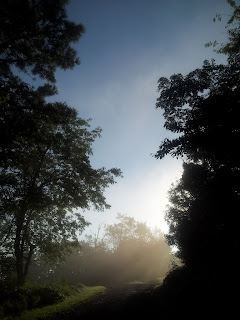 |
| Morning at camp. |
We picked up our camp at Shenandoah's Loft Mountain on Labor Day, and not
missing a beat, headed for the camp store for some morning joe. A ranger was
leading a talk-and-walk a few miles away to Blackrock Summit, which sounded
like a mountain top to me. We scooted over to the trailhead to get our minds
prepared for another itty-bitty mountain climb. Yeah, pretty easy, but still
nursing a sore knee, I’ll take what I can get.
21. Blackrock Summit:
The ranger pointed out a prescribed fire area, where the Park Service
had intentionally burned the forest on one side of the trail in 2008 to mimic
the ecological benefits of natural fire. He stopped again to show us a small
American chestnut tree. All but extinct, these once wide-ranging, giant,
nut-producing trees were dominant in Shenandoah and across much of the
Appalachians. Tree trunks up to ten feet across were not uncommon. Instead of
looking out at a sea of oaks, hickory, locust and other trees we’re more
familiar with today, Americans over a century ago were marveling at great
stands of giant trees rivaling even the large, old-growth conifers of the
Pacific Northwest. As in the NW, the big trees were also decimated by logging
throughout much of their range.
When Asian chestnuts were introduced, they
brought a disease, chestnut blight, to which the American trees had no natural
resistance. They died off by the millions, decade by decade, until nearly all
disappeared. The roots often remain alive underground and frequently send up
new shoots, but the blight sets in after a few years and the young trees
quickly die off. Genetic monkeying has produced trees that are 94 percent
native and six percent Asian, which apparently provides for some resistance to
the blight, but the Park Service has been reluctant to plant the genetically
modified trees at Shenandoah in order to preserve natural forest conditions. It’s
very hard to imagine what the forest would have looked like with these
behemoths peppering the landscape.
 |
| American chestnut. |
The ranger led us up to the summit area, a large rock pile
created by freeze-thaw cycles cycling endlessly. A large talus field extended
across the upper slopes and a good distance below the trail. The ranger warned
of rattlesnakes that lived in the rocks. Unfazed, a mom and two young rock
scramblers, aged 5 and 6, headed for the summit, with Kris and I struggling to
keep up. All enjoyed the clambering and no one saw a snake. The view was most
excellent.
 |
| At the summit. |
Miles (RT): 1.0 mile; elevation gain: 200 feet
Cumulative mileage and gain: 97.5 miles / 28,450 feet
 |
| Big Meadow Lodge. We'll have to stay here sometime... |
 |
| And bask by the window... |
 |
| Or the fireplace... |
 |
| Or hang with the bears. |
22. Hogsback Mountain:
This little wooded bump hardly gets a mention. I’d mistaken it for
something else I thought would make a nice easy walk-up. The top is all radio
towers and buildings and no views, an anticlimactic way to end a fun couple of
days. But we were there and it’s September already, so darn tootin’ I’ll take
credit here for summit number 22. There were a few nice spots along the way, so
it wasn’t a total loss, plus we got to add a praying mantis to our East Coast
wildlife sightings list. The mini-trek also put me over the 100-mile mark to
date in attaining my sixty summits. But good grief, it’s September already and
I’ve got 38 to go. Hmmm.
Miles (RT): 4.0
miles; elevation gain: 400 feetCumulative mileage and gain: 101.5 miles / 28,850 feet
 |
| Just below the top. |










No comments:
Post a Comment